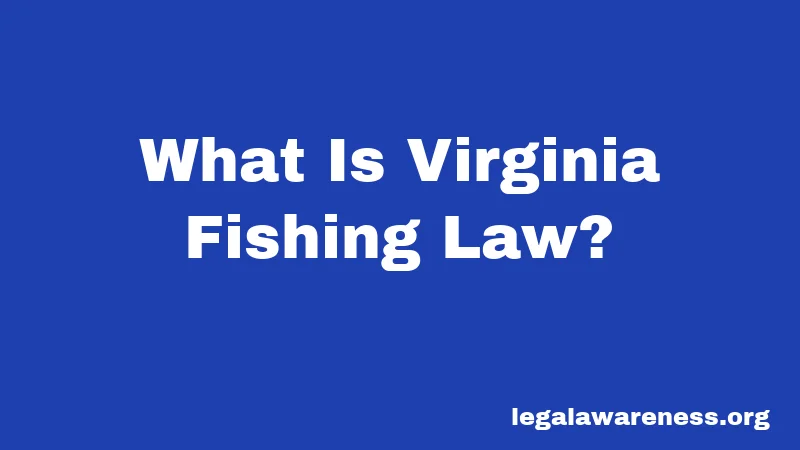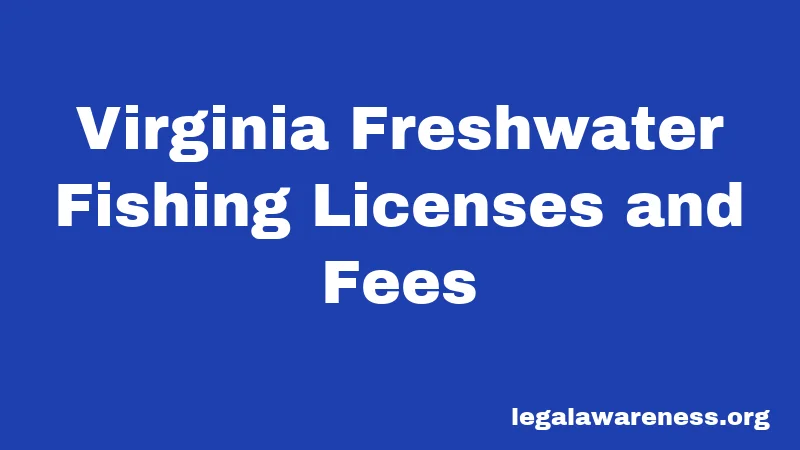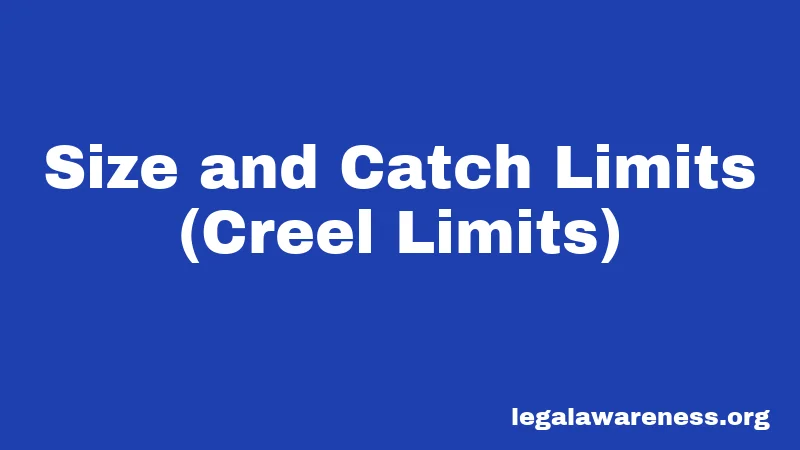Virginia Fishing Laws in 2026: A Complete Guide for Every Angler
Most people think fishing is simple. You get a rod, head to the water, and cast a line. But Virginia? Not so fast. The state has really specific fishing laws, and honestly, breaking them can cost you big time. Let’s break down exactly what you need to know before you hit the water.
You’re not alone if this feels confusing. Tons of anglers get tripped up on licensing, size limits, and bag limits. Here’s the good news: once you understand the basics, you’ll be fishing legally and responsibly.
What Is Virginia Fishing Law?

Okay, pause. Read this part carefully. Virginia’s fishing laws exist for a reason. They protect fish populations and make sure everyone gets a fair shot at catching fish. These regulations cover freshwater and saltwater fishing. They tell you what you can catch, how many, and what size they need to be.
The Virginia Department of Wildlife Resources (DWR) oversees freshwater fishing. The Virginia Marine Resources Commission (VMRC) handles saltwater rules. Both agencies enforce these laws seriously, and violators face real penalties. Think of it like a traffic ticket, but often more expensive and serious.
So basically, you need to know which agency controls the water you’re fishing in. Trust me, this matters.
Do You Need a Fishing License?
Here’s where most people get caught off guard. Yes, you probably need a license. Pretty much everyone ages 16 and older fishing in Virginia must have one. Whether you’re fishing in a lake, river, or the ocean—get a license.
But wait, there are exceptions. Not sure what counts as a violation? Let me break it down.
You DON’T need a license if:
You’re under 16 years old (residents only). You’re 65 or older fishing in saltwater only. You own the land where you’re fishing. You’re a guest on private property with the landowner’s written permission. You’re a tenant renting land, fishing on that rented property. You’re a member of certain Virginia tribes with proper identification. You’re an active-duty military member on official leave (no trout fishing, though).
Everyone else? Get a license before you wet a line. Honestly, this is the part most people miss.
Virginia Freshwater Fishing Licenses and Fees

Wondering if you need to break the bank for a license? Freshwater fishing licenses aren’t super expensive. Here’s what Virginia residents pay:
A basic one-year freshwater license costs $23. If you want to fish for trout in stocked waters, add another $23. Short on cash? A 5-day license runs just $14. The resident Sportsman’s License covers hunting and fishing for $100 per year.
Non-residents pay more. A one-year freshwater license costs $47. A 5-day option is $21. And here’s the thing: non-residents can grab a 1-day license for just $8. Perfect if you’re visiting from out of state.
Seniors (65+) get a nice break. Resident seniors pay only $9 for a freshwater license. That’s pretty straightforward.
Want to fish forever? Lifetime licenses are available. You pay once, fish for life. Prices vary, but for many people, it’s worth it if you fish regularly.
You can buy licenses online at gooutdoorsvirginia.com, by phone at 804-367-1000, or at local license agents. It literally takes minutes.
Saltwater Fishing Licenses in Virginia
Saltwater fishing? Different rules. Resident licenses run $17.50 for saltwater only. If you want to fish both freshwater and saltwater, a combined license costs $39.50. Non-residents pay $25 for saltwater.
Here’s an interesting option: the tidal boat license. Own a boat? This $126 license (residents) covers you and your passengers fishing in Virginia’s tidal waters. Non-residents pay $201.
Actually, there’s one more thing. If you fish without a license but in saltwater, you must register for free with Virginia’s Fisherman Identification Program (FIP). Seniors over 65 don’t need a license for saltwater but still must register with FIP. Make sense, right?
Size and Catch Limits (Creel Limits)

Okay, this one’s important. You can’t just catch unlimited fish. Virginia has specific size limits and creel limits (daily catch limits). These vary by species and location.
Let’s say you’re after largemouth bass. The statewide limit is 5 fish per day with a 12-inch minimum size. But wait, some lakes have different rules posted on-site, and those rules are what you must follow.
Muskellunge (musky) has stricter limits. You can only keep 1 per day, and it must be at least 40 inches. This protects these big, hard-to-catch fish.
Crappie? You can take 25 per day, with a 9-inch minimum. Catfish? No limit. Bullheads are 20 per day now (that’s a recent change worth knowing).
The confusing part? Some rivers and lakes have different rules. Always check posted signs at the water you’re fishing. If rules are posted, follow those instead of statewide rules.
Sound complicated? It’s actually not. Just check before you go, and you’ll be fine.
Important Fish You Cannot Possess
Here’s where things get serious. Some fish are completely protected. You literally cannot keep them, even if you catch them.
River herring (blueback herring and alewife) cannot be possessed. If you catch one by accident, release it immediately. American shad has the same rule—catch and release only. These protections help maintain fish populations.
Also, if you somehow catch an invasive snakehead, you must immediately kill it and notify DWR. Call their headquarters at 804-367-2925 to report it. They want invasive species eliminated.
This part can be tricky, honestly. These rules change occasionally, so check the DWR website before fishing.
Saltwater Fishing Specifics
Saltwater fishing has its own complex rules. The VMRC manages these waters and species carefully.
Spanish mackerel, for example, has a 500-pound possession limit per vessel per day from October through February. Striped bass has seasonal changes and size requirements that shift throughout the year.
Cobia recently had a regulation change. You no longer need a special permit. The season runs June 15 to September 15, with 1 fish per person (2 per vessel maximum). Minimum size is 40 inches total length.
Here’s where it gets interesting. Virginia saltwater regulations sometimes align with federal rules. If you’re fishing offshore, federal regulations apply. Some species have completely different rules depending on where you’re fishing.
This is probably the most complex part of Virginia fishing law. Honestly, your best move? Check the VMRC website before each trip. Rules change seasonally and sometimes suddenly.
Trout Fishing in Virginia
Trout fishing has special rules. If you’re fishing in designated stocked trout waters (which DWR stocks between October 1 and June 15), you need a separate trout license. That’s in addition to your regular freshwater license.
The trout license costs residents $23. Non-residents pay $23 as well. Some special trout areas have catch-and-release-only rules.
Youth-only stocked trout waters let kids fish with special privileges. Trout Heritage Waters are for experienced anglers. Urban Program Waters bring trout to city areas.
Want to fish for trout? Know which type of water you’re visiting. Rules vary dramatically between these areas.
Penalties and Consequences
Okay, this is the part that gets people’s attention. Break Virginia’s fishing laws, and you’ll face real consequences.
Fishing without a license? You could face a fine up to $250 for a first offense. Second offense? Up to $500. These add up fast.
Violating creel (bag) limits is a Class 3 misdemeanor. That can mean a fine between $25 and $250. Larger violations mean bigger penalties.
Illegal fishing methods (like explosives or poison) are much more serious. Using explosives to catch fish is a Class 1 misdemeanor. You could face up to a year in jail and fines up to $1,000. Yes, really.
Violating regulations on special protected species can result in fines exceeding $1,000 plus equipment seizure and license suspension. Repeat offenders face increasingly harsh penalties.
Here’s the thing: conservation officers actively patrol Virginia waters. They check licenses regularly. Honestly, it’s just not worth the risk.
Special Circumstances and Exceptions
Some situations have unique rules. Let me clarify the confusing ones.
If you fish on someone else’s private property, you need their written permission. Being a guest doesn’t count—guests need licenses too. The only exception is family landowners and their immediate family.
Corporate landowners (50% or more ownership) can fish their property without licenses. Stockholders get the same privilege.
Active-duty military members on official leave can fish without a license, but they still can’t fish for trout in designated stocked trout waters. They need to show leave papers if asked.
Disabled veterans can qualify for special lifetime licenses at reduced rates. Applications are available through DWR’s forms section.
Pretty straightforward once you know the exceptions, right?
How to Get Your License and Stay Compliant
Getting a license is simple. Visit gooutdoorsvirginia.com and create an account. Select your license type, pay with a credit card, and you’re done. You can print it immediately or just have the digital copy on your phone.
No internet? Call 804-367-1000 between 8:30 AM and 4:30 PM on weekdays. License agents throughout Virginia sell licenses too. Just search online for one near you.
Once you have your license, carry it with you. You need to show it immediately if a conservation officer asks. Electronic copies on your phone count. Printed copies work too.
Here’s my advice: before each fishing trip, spend two minutes checking the DWR or VMRC website. Regulations change. New closures happen. Staying informed takes minutes but saves you hundreds in potential fines.
Know the specific water you’re fishing. Check posted signs. Measure fish before you keep them. Keep track of how many you’ve caught. These simple steps keep you legal.
Important Recent Changes
Virginia has made some recent regulation changes. Stay with me here because these matter.
Muskellunge (musky) now has a 1-per-day limit statewide with a 40-inch minimum. That’s stricter than some old rules, so if you musky fish, pay attention.
Northern pike now has the same size and creel limit as chain pickerel. The Blackwater River in the Chowan drainage basin now includes geographic exceptions for rock and Roanoke bass.
The creel limit for bullheads increased to 20 per day (from previous lower limits). Striped bass regulations frequently shift, so these definitely warrant checking the most recent regulations.
Certain areas that previously had special slot limits no longer do. For example, the New River from New Fields Dam downstream to Claytor Dam now follows statewide regulations instead of special rules.
These changes happened recently, and honestly, many anglers still don’t know about them. You now do.
What to Do If You’re Unsure
Confused about the difference? Let me break it down. Contact DWR for freshwater questions at their headquarters, regional offices, or by phone at 804-367-2925. VMRC handles saltwater questions. Call them at 757-247-2200 or visit their website.
Don’t guess on regulations. These agencies are helpful and want anglers to comply. A quick phone call beats a fine any day of the week.
If you see someone breaking fishing laws, report it. You can contact conservation officers directly. Providing details about violations helps protect Virginia’s fish populations for everyone.
Frequently Asked Questions
Do I need a license to fish on my own property? If you own the land and water, no. But if you’re visiting someone else’s private pond as a guest, yes, you need a license unless they’re a family member or the property is registered as private with special exemptions.
What happens if I catch a fish that’s too small? Release it immediately and unharmed. Don’t keep it. If a conservation officer checks your catch and finds undersized fish, you face penalties even if you caught them accidentally.
Can I fish at night in Virginia? Yes, most freshwater fishing is allowed 24/7 year-round. Some areas have restrictions posted. Saltwater night fishing rules vary by species. Check VMRC’s website for specific species regulations.
Do I need a license to fish from a pier? Fishing from licensed public piers doesn’t always require a license. Licensed charter boats and licensed party boats are exempt areas. But double-check with the pier—rules vary by location.
What’s the difference between creel limit and possession limit? Creel limit is how many fish you can catch and keep per day. Possession limit is how many you can have in your possession at one time. For most species, these are the same, but always verify.
Are there catch-and-release only waters? Yes. Some trout waters and designated areas require catch-and-release only. Posted signs indicate these areas. Always read the signs at your fishing location.
What should I do with my catch? Virginia allows you to keep fish within legal limits. Cook them, eat them, and enjoy them responsibly. Some fish are caught for food; others are mainly for sport. Either way, follow the regulations.
Final Thoughts
Now you know the basics of Virginia fishing laws. You understand licensing, size limits, catch limits, and what happens if you break the rules. Knowledge is power, and you’re now prepared to fish legally and responsibly.
Fishing in Virginia is awesome. The state has amazing freshwater lakes, rivers, and some fantastic saltwater opportunities. Don’t let regulations intimidate you—they’re there to protect these resources for everyone.
Before your next trip, grab your license. Check the regulations for the specific water you’re fishing. Measure your fish. Know your limits. Do these things, and you’ll stay on the right side of Virginia’s fishing laws.
Stay informed, stay safe, and when in doubt, ask a conservation officer or visit the DWR or VMRC websites. They exist to help you fish legally and successfully.
References
Virginia Department of Wildlife Resources – Fishing Regulations
Virginia Marine Resources Commission – Recreational Fishing
Go Outdoors Virginia – Fishing Licenses
Virginia DWR – Fishing License Fees and Information
2026 Virginia Freshwater Fishing Regulations Guide
Virginia Marine Resources Commission – Saltwater Regulations
